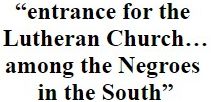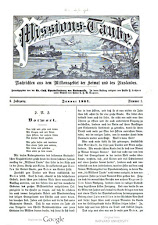An Appeal Concerning our Negro Mission.
The Synodical Conference, which met at Cleveland, Ohio., from August 13 to 19 of this year, dealt in detail in its afternoon sessions with the Negro Mission which it has undertaken, and has instructed the Commission for Negro Missions to publish an appeal concerning the Negro Mission in the papers published within the Synodical Conference. The purpose of this appeal is to call attention to the status and prospects of the Negro Mission, and possibly to cause all our dear Christians to give it the attention which, in the opinion of the Conference, it deserves.
It is an obvious fact that the Negro Mission, although it was started by decision of the Synodical Conference some years ago, is met with distrust by many individuals and congregations. In many cases, it was thought that the Negro Mission would hardly ever result in anything right because of the prevailing conditions, and that it would therefore be better to devote time and energy to other work. The supposed reasons for this opinion will not be discussed in detail here.
At its last meeting, the Synodical Conference was convinced that our Negro Mission was by no means hopeless before the eyes of men, but was rather enjoying a strong and healthy prosperity. The young mission counts 80 communing members, has 3-400 children in the mission schools and a number of adults in special instruction. Work has been done in the church and school in silence, without much external attention, and by God's grace the work has not been in vain. In particular, it can be said of our main station, New Orleans, that there, as far as men can judge, the Lutheran Church has gained a firm foothold among the Negroes.
Here the mission has 60 communing members in two stations, who are organized into two small congregations, in which Word of God rules in doctrine and practice. Here the mission also has two weekly mission schools, in which about 200 Negro children are taught Lutheran catechism, biblical history, etc. year in and year out. Here the parishioners have also begun to give contributions for church purposes, in order, God willing, to be able to sustain themselves later on.
The Synodical Conference not only took note of this stand with joy and thanksgiving to God, but also decided to put double and triple effort into the Negro Mission. There is still much room for our mission in the South. In New Orleans, a number of Negro children who have crowded into our Lutheran schools have repeatedly had to be turned away because the schools were already filled. Furthermore, according to the report of our missionary, there are still parts of the city in which the mission could and should be started, just as in the already occupied area. Thus, the Commission has been instructed to open a third preaching station and mission school in New Orleans as soon as the forces and means are available. Furthermore, reports indicate that there are still many thousands of heathen Negroes living in the rural districts of Louisiana. Here, too, preaching stations and Lutheran mission schools should be established.
If we occupy the still free area in this way, the Lutheran Church could, by God's grace, soon gain a firm foothold among the Negroes in the South. Especially through our weekly schools, we could gain an entrance for the Lutheran Church in the present relationship among the Negroes in the South. In the South, the schools are generally very deficient, but there is a complete lack of Christian weekly schools. Thus we find a free area for our mission schools in many places and through them we would first bring the whole youth under the influence of the Word of God. And our congregations know how the church is built through such schools through their own parochial schools, and we have already been able to experience this in our Negro Mission schools.
The Synodical Conference was now of the opinion that if our congregations were made acquainted with the state of the Negro Mission and the prospects for the same, then certainly all hearts would turn to it. God grant it! The Negro Mission needs more workers first. So let our dear Christians pray to the Lord of the harvest that among the workers who are now being trained in increasing numbers for service in church and school, He will make some willing to devote not just a few years but their entire lives to the service of the Negro Mission. Then the Negro Mission needs more money. So far, a relatively small number of congregations have accepted this mission with gifts, and the love of these congregations has ensured that the work could be carried out. Now, however, the work should be extended further, as has just been explained. For this, more earthly means are needed. Thus, all our Christians should help to ensure that the necessary means are soon provided.
The Synodical Conference did not conceal from itself that the individual synods belonging to it have their main task in the so-called Internal (or Home) Mission, that the next good work of the individual synods is this, to introduce the immigrating Germans into the Lutheran Church, which is blossoming so wonderfully here by God's grace. The Synodical Conference therefore did not want the Negro Mission to be pushed into the foreground by this appeal at the expense of the inner mission. However, it was of the opinion that our dear Christians would be willing to introduce at the same time the poor abandoned Negroes, whom God has taken to our door, into the blessed home of the church of the Reformation. We were also indebted to the poor Negro long ago. God has given us the earthly means to carry out this work as well. The Synodical Conference felt that it would perhaps be best if, in addition to regular giving to the Internal Mission, we would also regularly give small gifts to the Negro Mission. In this way, since God has made us a numerous Lutheran people, there would be no shortage of funds to operate the Negro Mission.
As experience has shown, there is a lack of acquaintance with the Negro Mission in our congregations. The Synodical Conference therefore asks the pastors, as much as they can, to make the congregations acquainted with the Negro Mission and to make it their business to distribute the Mission Dove [see left] and the Pioneer, which regularly report on the Negro Mission. If our Christians know about the Negro Mission, they will certainly have hearts and gifts for it.
There was one more point that the Synodical Conference wanted mentioned in this “Appeal”. A request was made to them to immediately start an actual heathen mission, for example in China or Japan. This subject was also discussed in detail. The result of the discussion was approximately the following: We are keeping the heathen mission in mind; for we recognize the obligation to bring the Gospel to the Gentiles as long as there is still one heathen. But at the moment we still have our hands full in our own country. We have within the Synodical Conference not only the vast field of internal missions, as well as the mission to the Jews, but before our eyes in the Southern States are hundreds of thousands of heathen Negroes. Shall we go past these into the heathen lands? Shall we leave the Negroes in our own country to the pope, who is making great efforts to introduce them into his anti-Christian empire, or to the sects which are now making up their minds to conquer the South with their missions? No, we must first do the work that God has taken away from us in our own country. And if we do here what we should do, then God will show us the way to the heathen countries. Therefore, the Synodical Conference is of the opinion that our Christians should give to the Negro Mission the gifts that they would give to the Gentile Mission under other circumstances. However, if someone wants to give gifts for the heathen mission already now, so that a larger sum of money is immediately available for the start of the same, he is not prevented from doing so. The gifts sent specifically for “Heathen Mission” will be kept and not used for the Negro Mission.
Now, to Him, the Lord of the Church, also the work of the Negro Mission is commended. May He abundantly give His grace and blessing to our work, and let us not be sluggish to do what we ought to do. Amen.
On behalf of the Commission for Negro Mission
St. Louis, Mo., September, 1884.
F. Pieper.
“[James] Cone’s teaching highlights the LCMS’ racism that forced black ministers to go to these lengths [German culture] just to belong.”







No comments:
Post a Comment
Comments only accepted when directly related to the post.